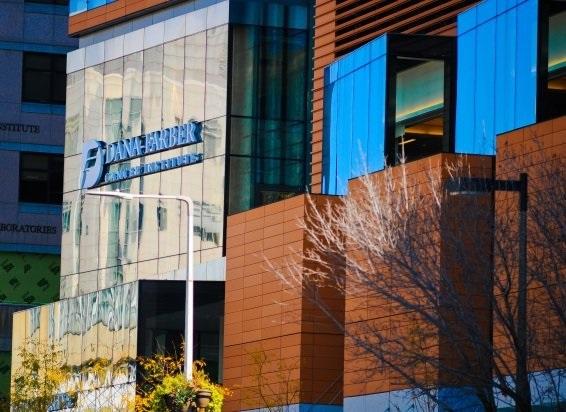Dana-Farber researchers present findings at ASCO annual meeting
Researchers from Dana-Farber Cancer Institute will be presenting more than 70 research studies at this year’s annual meeting of the American Society of Clinical Oncology (ASCO) in Chicago, June 1st-5th.
The latest cancer research findings from Dana-Farber faculty will show new treatments and diagnostic advances in lung, breast, ovarian, and brain cancers, multiple myeloma and many others. Some of the research highlights being presented at the conference include:
Immunotherapy/PARP inhibitor combination produces ovarian cancer remissions at much higher rate than either drug alone, phase I/II clinical trial shows
TOPACIO/Keynote-162: A phase 1/2 study of niraparib + pembrolizumab in patients (pts) with advanced triple-negative breast cancer or recurrent ovarian cancer
Panos A. Konstantinopoulos, MD, PhD - First Author, Dana-Farber Cancer Institute
A phase I/II clinical trial found a combination of the drugs niraparib and pembrolizumab to be significantly more effective than either drug alone in patients with advanced triple-negative breast cancer or recurrent ovarian cancer. Trial participants, who had responded to front-line chemotherapy for at least six months before relapsing, received 200 mg daily of niraparib, a PARP inhibitor, and 200 mg of pembrolizumab, an inhibitor of the PD-1 immune checkpoint, every 21 days. The combination produced an objective response in 25 percent of the 60 evaluable participants, and in 45 percent of those whose tumors had BRCA mutations. That compares to response rates of less than 5 percent in similar patients treated with PARP inhibitors alone, and 11 percent in patients with ovarian cancer treated with pembrolizumab alone.
The median duration of the response to niraparib plus pembrolizumab was 9.3 months – longer than the duration of response that led to the Food and Drug Administration's approval of PARP inhibitors as single therapy in patients with BRCA-mutated ovarian cancer. The benefit of the combination was seen in patients regardless of whether their tumors tested positive for PD-L1.
"These results are extremely promising for this set of patients, who have had several previous treatments and don't respond to platinum chemotherapy, and therefore have few other treatment options available," said Dana-Farber's Panos Konstantinopoulos, MD, PhD, who led the trial and will present the findings at ASCO.
Personalized cancer vaccine shows vigorous immune response in some patients with glioblastoma
Robust systemic and intratumoral T Cell responses induced by personalized neoantigen-targeting vaccine in glioblastoma patients
David A. Reardon, MD - First Author, Dana-Farber Cancer Institute
Personalized vaccines consisting of neoepitope peptides – molecules that stimulate a specific response of the immune system against neoantigens on cancer cells – sparked a vigorous immune response in some patients with glioblastoma brain cancer who participated in a phase 1b clinical trial. Neoepitope vaccines are a novel form of immunotherapy in which patients are injected with neoepitope peptides derived from those on their own tumor cells. (Neoepitopes are the portions of cancer cell neoantigens recognized by the immune system.)
In the study, eight patients with glioblastoma brain cancer underwent surgery and radiation therapy followed by injection of up to 20 neoepitope peptides deemed likely to stimulate a robust immune response against neoantigens on their tumor cells. Only mild side effects resulted from the vaccine. The median progression-free survival was 7.5 months, and the median overall survival was 16.8 months. Three patients who required dexamethasone during vaccine priming failed to generate immune responses. However, two patients who did not receive dexamethasone generated strong immune responses against multiple neoantigens. Increased numbers of tumor-infiltrating CD4 and CD8 T cells were detected in these to patients.
"Our study utilizes robust pipelines developed at Dana-Farber, incorporating next-generation sequencing and prediction of immunogenic tumor-specific mutations, to generate an individualized vaccine for each patient," said Dana-Farber's David Reardon, MD first author of the study. "This initial study, which confirms feasibility, safety, and the ability of this approach to generate meaningful anti-tumor immune responses capable of traveling into the tumor in the brain, serves as a foundation from which we will expand to combinatorial immunotherapy approaches with this exciting vaccine platform."
New drug combination helps keep relapsed multiple myeloma in check
Phase 3 OPTIMISMM trial: Pomalidomide (POM), bortezomib, and low-dose dexamethasone (PVd) vs bortezomib and low-dose dexamethasone (Vd) in lenalidomide (LEN)-exposed patients (pts) with relapsed or refractory multiple myeloma (RRMM)
Paul G. Richardson, MD - First Author, Dana-Farber Cancer Institute
For patients with multiple myeloma who have been treated with lenalidome but have relapsed and not responded to other therapy, a three-drug combination can significantly extend the time in which the disease is held in check, a phase III trial shows.
The trial enrolled 559 patients who had relapsed after treatment with lenalidomide. After a median of 16 months, those who received pomalidomide, bortezomib, and low-dose dexamethasone had a 39 percent lower risk of disease progression or death than those who received bortezomib and low-dose dexamethasone. The most common side effects of the drug combinations were neutropenia, infections, and thrombocytopenia, which were largely manageable.
“Despite important recent advances in the treatment of Multiple Myeloma, there remains an unmet medical need for those patients who have received lenalidomide based therapies and are in early relapse,” said Paul Richardson, MD, Clinical Program Leader and Director of Clinical Research, Jerome Lipper Multiple Myeloma Center at Dana-Farber. These are the first phase III clinical findings to report a significant and clinically meaningful progression-free survival in patients who have previously received lenalidomide, and especially those who are lenalidomide-refractory. Pomalidomide-bortezomib-dexamethasone provides a new therapeutic platform for yet further treatment advances such as the incorporation of monoclonal antibodies.”
Media Contacts
If you are a journalist and have a question about this story, please call 617-632-4090 and ask to speak to a member of the media team, or email media@dfci.harvard.edu.
The Media Team cannot respond to patient inquiries. For more information, please see Contact Us.
